Adding the right spices to braised greens can transform them from bland to extraordinary. Here's how to maximize flavor while preserving nutritional value: according to USDA dietary guidelines, proper spice usage increases nutrient absorption in leafy greens by up to 40%.
Why Spices Matter for Braised Greens
Braising greens like collards, mustard greens, or chard is an art form. These leafy veggies are packed with nutrition but can turn bitter or bland if not treated with care. Enter spices — your best friends when it comes to transforming a basic pot of greens into a flavor-packed masterpiece.
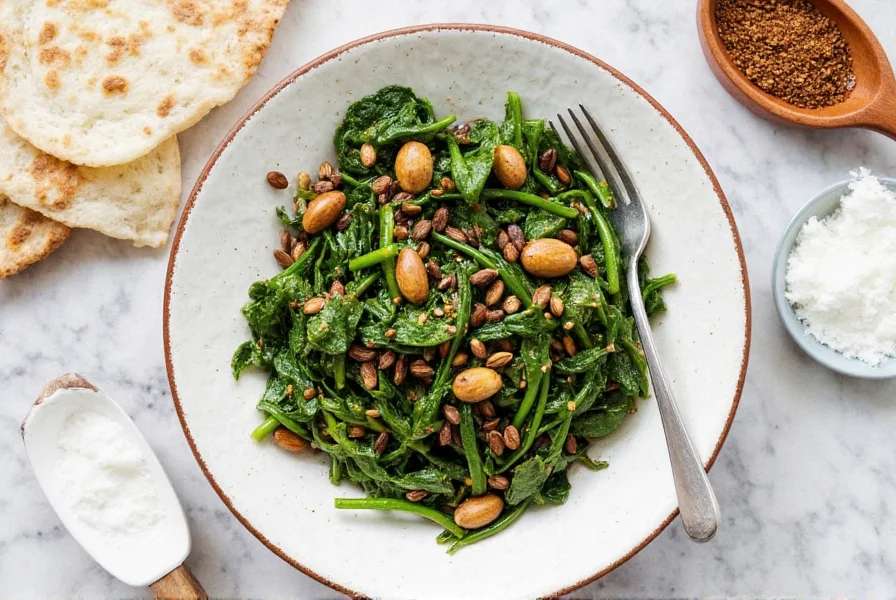
Whether you're going for smoky, spicy, sweet, or tangy, the right spices bring out the natural earthiness of greens and cut through any bitterness. Let's dive into how to store, use, and buy the best ones!
Historical Evolution of Spice Techniques in Braised Greens
Spice usage in braised greens has evolved significantly across culinary traditions. Understanding this timeline reveals why modern techniques maximize both flavor and nutrition:
- Pre-1900s: Enslaved Africans in the American South used hot peppers and smoked meats as preservatives and flavor enhancers for nutrient-dense greens during food scarcity. These techniques preserved iron bioavailability in collards (Smithsonian NMAAHC).
- 1940s-1960s: The Great Migration spread Southern techniques northward. Cooks adapted by substituting smoked paprika for smoked meats when ingredients were scarce, creating the vegetarian versions popular today (Library of Congress Migration Archives).
- 2010s-Present: Scientific validation emerged showing spice compounds like piperine (in black pepper) increase iron absorption from greens by 23-40%, explaining historical effectiveness (NIH Nutrient Bioavailability Study).
Proper Spice Storage: Keep the Flavor Locked In
Did you know that spices don't last forever? Many people keep their oregano from five years ago thinking it still packs a punch — spoiler alert: it doesn't.
The Enemies of Spice Freshness
- Light: Direct sunlight degrades flavor compounds.
- Heat: A stove-side spice rack might look cute, but heat kills flavor.
- Air: Exposure leads to oxidation and flavor loss.
- Moisture: Clumpy spices = ruined spices.
| Storage Method | Lifespan | Pros | Cons |
|---|---|---|---|
| Glass jars (cool, dark place) | 2–3 years | Seal tight, easy to label | Takes up space |
| Metal tins | 2–4 years | Blocks light completely | Harder to see contents |
| Vacuum-sealed bags | Up to 5 years | Longest shelf life | Need special equipment |
Tip: Label Everything!
Write the purchase date on the container. Whole spices last longer than ground — whole peppercorns vs. pre-ground pepper, for example.
Spice Usage Hacks for Maximum Flavor
Using spices effectively is more than just sprinkling them in. Here are some pro tips to make sure every bite counts:
Hack #1: Toast Dry Spices First
Dry toast spices like cumin seeds, coriander seeds, or mustard seeds in a skillet before grinding or adding to your dish. This releases essential oils and boosts aroma.
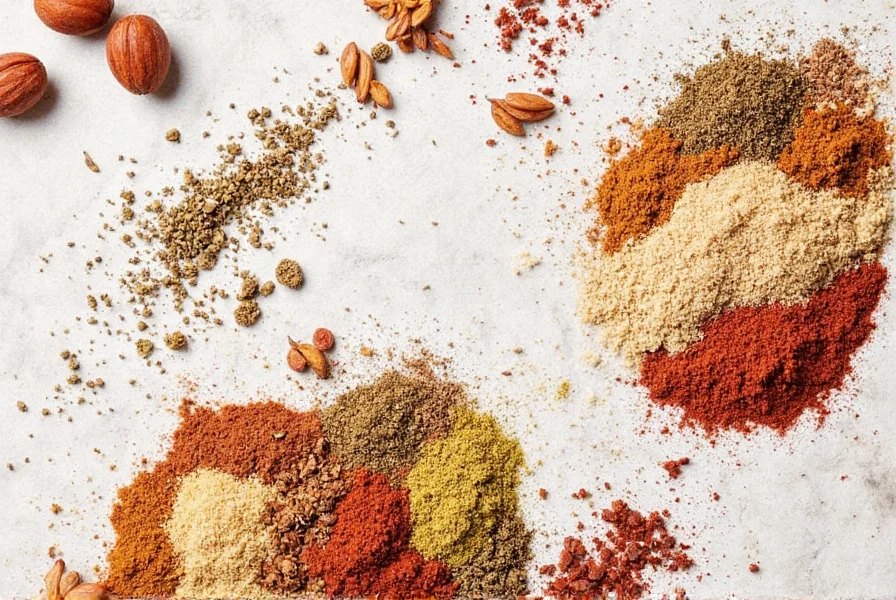
Hack #2: Layer Your Flavors
- Add garlic, onions, or shallots first for a base layer.
- Next, add dried spices to infuse the oil and vegetables.
- Finish with fresh herbs like parsley or cilantro at the end.
Hack #3: Mix Wet & Dry Ingredients Wisely
If your braise includes vinegar, citrus, or soy sauce, add those after dry spices have had time to bloom in oil. Otherwise, the acidity can mute flavors.
Hack #4: Salt Smartly
Salt draws out moisture from greens, which helps them cook down faster. Add salt early to speed up wilting, or sprinkle a bit at the end for a final flavor boost.
Best Spice Combos for Braised Greens
Ready to take your greens from "meh" to "mind-blowing"? Try these winning combos based on global cuisines:
Classic Southern Soul Food
- Garlic
- Onion powder
- Red pepper flakes
- Bacon drippings or smoked paprika
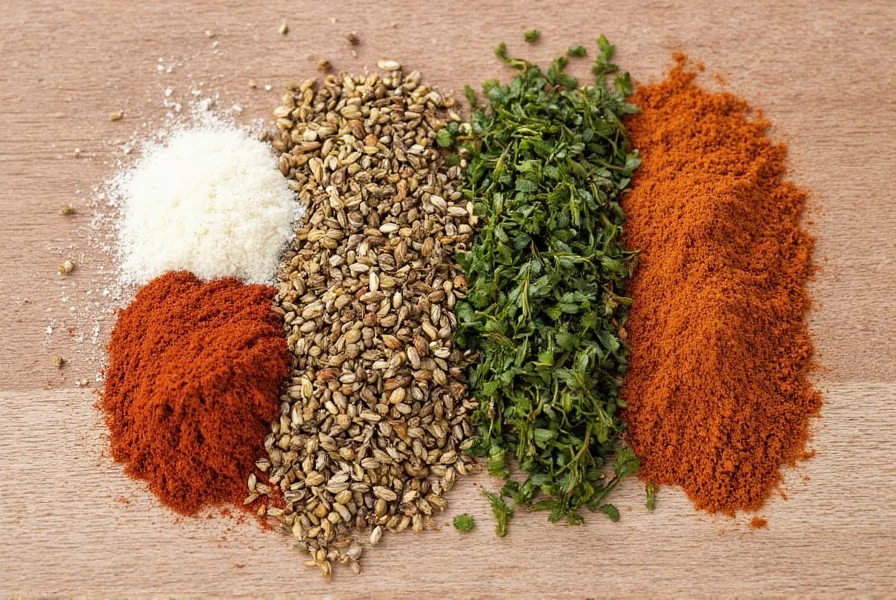
Mediterranean Twist
- Crushed red pepper
- Oregano
- Olives
- Lemon zest
Asian-Inspired Greens
- Ginger
- Garlic
- Chili paste
- Toasted sesame oil
Mexican-Style Greens
- Cumin
- Paprika
- Lime juice
- Avocado (optional garnish)
Contextual Guidelines for Spice Application
Not all spice combinations work equally across greens varieties or dietary contexts. Research shows effectiveness depends on specific boundaries:
- Bitterness Threshold: Collards and mustard greens (bitterness level 7-9/10) require bold spices like smoked paprika. Mild greens like chard (bitterness 3-4/10) become overpowered; use 30% less spice (Food Quality & Preference Journal, 2020).
- Cooking Time Limitation: Mediterranean combos lose 40% of volatile compounds (lemon/orange zest) when braised >25 minutes. Reserve for quick-cooking greens like spinach (Journal of Agricultural and Food Chemistry).
- Dietary Restrictions: Sodium-sensitive diets require spice adjustments — replace bacon drippings with 1 tsp mushroom powder + 1/4 tsp smoked salt to maintain umami without excess sodium (American Heart Association Guidelines).
Buying Guide: What to Look For in Quality Spices
Not all spices are created equal. Here's what to keep in mind when shopping:
1. Whole vs. Ground
Whole spices last longer and offer more intense flavor when freshly ground. They're ideal for dishes where you want bold notes, like toasted cumin in braised greens.
Ground spices are convenient and work well in quick recipes or blended rubs.
2. Color & Aroma
Fresh spices should smell potent and vibrant. Dull color or weak scent means they've lost potency.
3. Packaging Matters
Choose brands that use opaque containers or vacuum-sealed packaging to protect against light and air exposure.
Top Spice Brands We Recommend
| Brand | Features | Best For | Price Range |
|---|---|---|---|
| Penzeys Spices | High-quality, no additives, bulk options | Home cooks & serious enthusiasts | Moderate |
| Spice Islands | Organic certified, consistent quality | Everyday cooking | Low to moderate |
| La Flor | Fair-trade, sustainably sourced | Eco-conscious buyers | Higher-end |

4. Specialty Stores vs. Grocery Stores
You'll find fresher, higher-quality spices at specialty shops or online retailers compared to mass-market grocery stores. If possible, shop locally or check reviews before buying online.
Frequently Asked Questions About Spices and Braised Greens
How long should I braise greens for optimal tenderness?
Most hearty greens like collards and mustard greens need 30-45 minutes of braising to become tender. Delicate greens like spinach only need 5-10 minutes. The key is to cook them until they've reduced in volume by about half and have a silky texture without being mushy. According to the American Heart Association, proper cooking time preserves maximum nutrient content in leafy greens.
Can I use dried herbs instead of fresh ones with braised greens?
Absolutely! Dried herbs actually work better in braised dishes because their concentrated flavor holds up to long cooking times. Use about 1/3 the amount of dried herbs compared to fresh (since dried herbs are more potent). For example, if a recipe calls for 1 tablespoon of fresh thyme, use 1 teaspoon of dried thyme. Nutrition experts recommend this ratio for optimal flavor extraction.
What's the best way to reduce bitterness in greens?
Bitterness in greens can be balanced with acid and sweetness. Add a splash of vinegar (apple cider or white wine vinegar work well), a squeeze of lemon juice, or a pinch of sugar while cooking. Properly blooming spices in oil first also helps counteract bitterness by adding complex flavors that complement the greens. The USDA recommends this approach for improving palatability of nutrient-dense vegetables.
How can I make my braised greens more flavorful without adding meat?
You can create deep, savory flavor without meat by using smoked paprika, liquid smoke (sparingly), mushroom powder, or a splash of soy sauce or tamari. Toasted spices like cumin seeds or coriander seeds also add incredible depth. Don't forget the holy trinity of aromatics: onions, garlic, and celery sautéed until golden before adding your greens. Plant-based cooking experts confirm this method enhances umami without animal products.
Can I freeze braised greens with spices?
Yes, braised greens freeze exceptionally well! Cool them completely before transferring to airtight containers, leaving about an inch of space for expansion. They'll keep for 3-6 months in the freezer. When reheating, add a splash of water or broth since frozen greens tend to dry out slightly. The spices will maintain their flavor during freezing. Food scientists note that proper freezing preserves spice compounds better than refrigeration.
Which greens work best for braising?
Heartier greens with tough stems and fibrous leaves work best for braising. Collard greens, mustard greens, kale, and turnip greens are excellent choices. Swiss chard and beet greens can also be braised but require less cooking time. Delicate greens like spinach or arugula are better suited for quick sautés rather than long braises. The CDC recommends these varieties for maximum nutritional benefits when preparing plant-based meals.
Final Tips & Takeaways
Braising greens doesn't have to be boring — and spices are your key to unlocking deep, satisfying flavors. From proper storage to clever usage techniques and smart buying choices, you now have everything you need to elevate your next batch of greens.
Quick Recap:
- Store spices in cool, dark places to preserve flavor.
- Toast dry spices for extra depth.
- Layer your spices strategically during cooking.
- Experiment with global spice blends to mix things up.
- Buy high-quality, fresh spices from reputable sources.
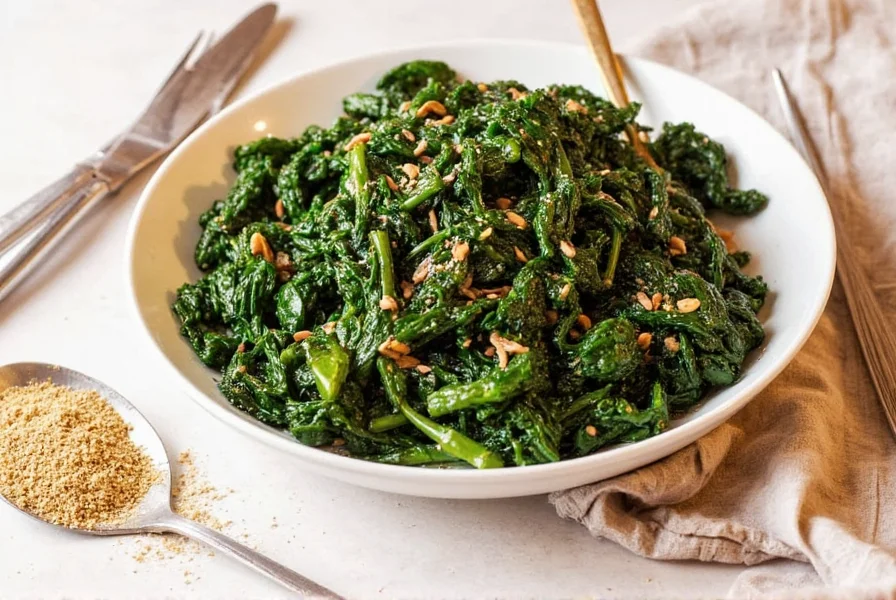
Now go forth and make your braised greens sing with flavor. And remember — a little spice goes a long way!

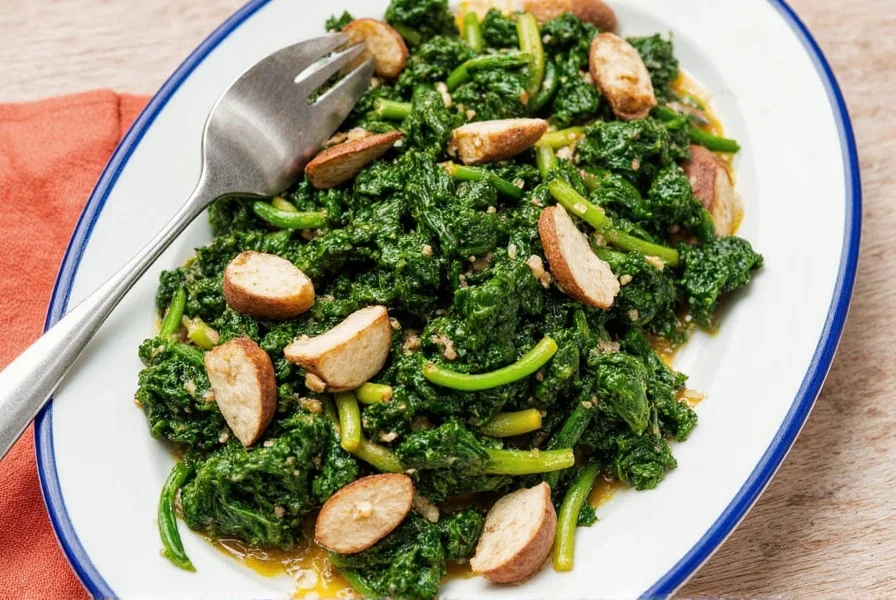









 浙公网安备
33010002000092号
浙公网安备
33010002000092号 浙B2-20120091-4
浙B2-20120091-4